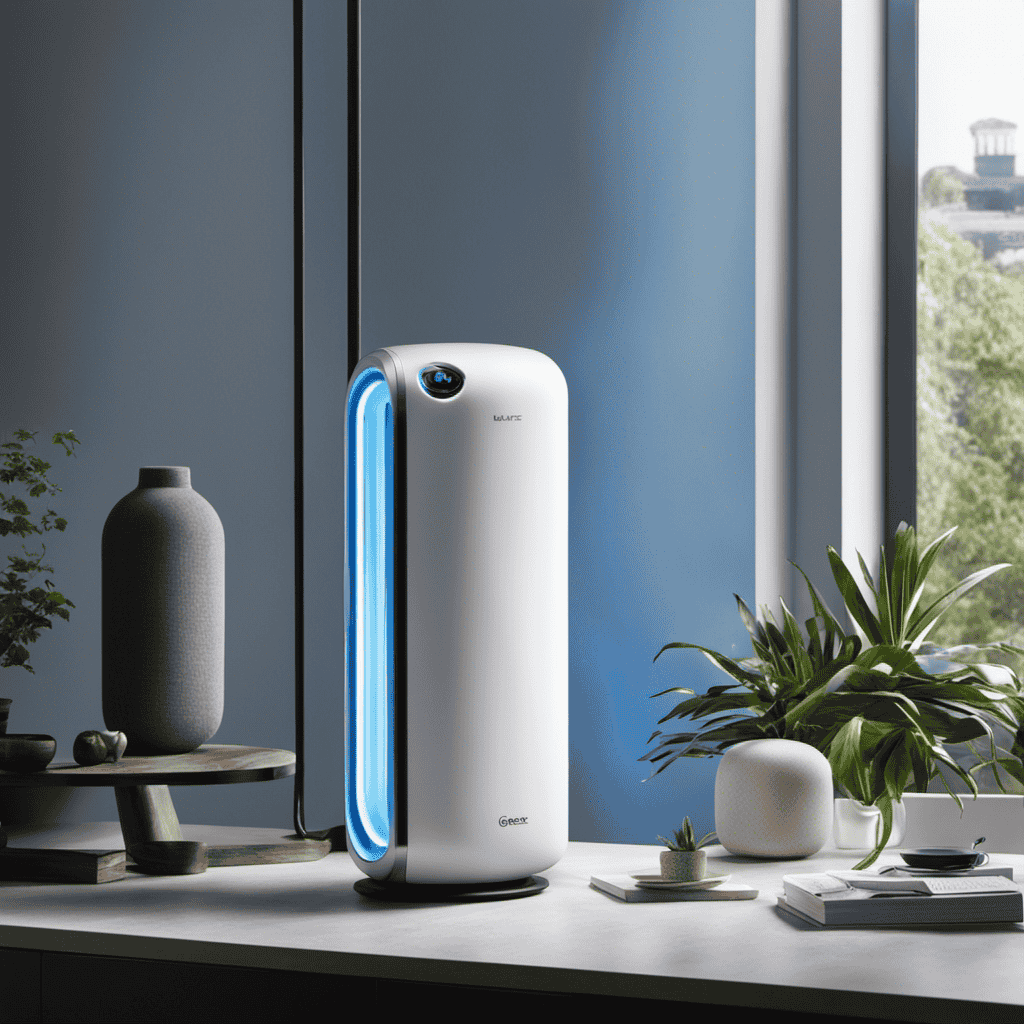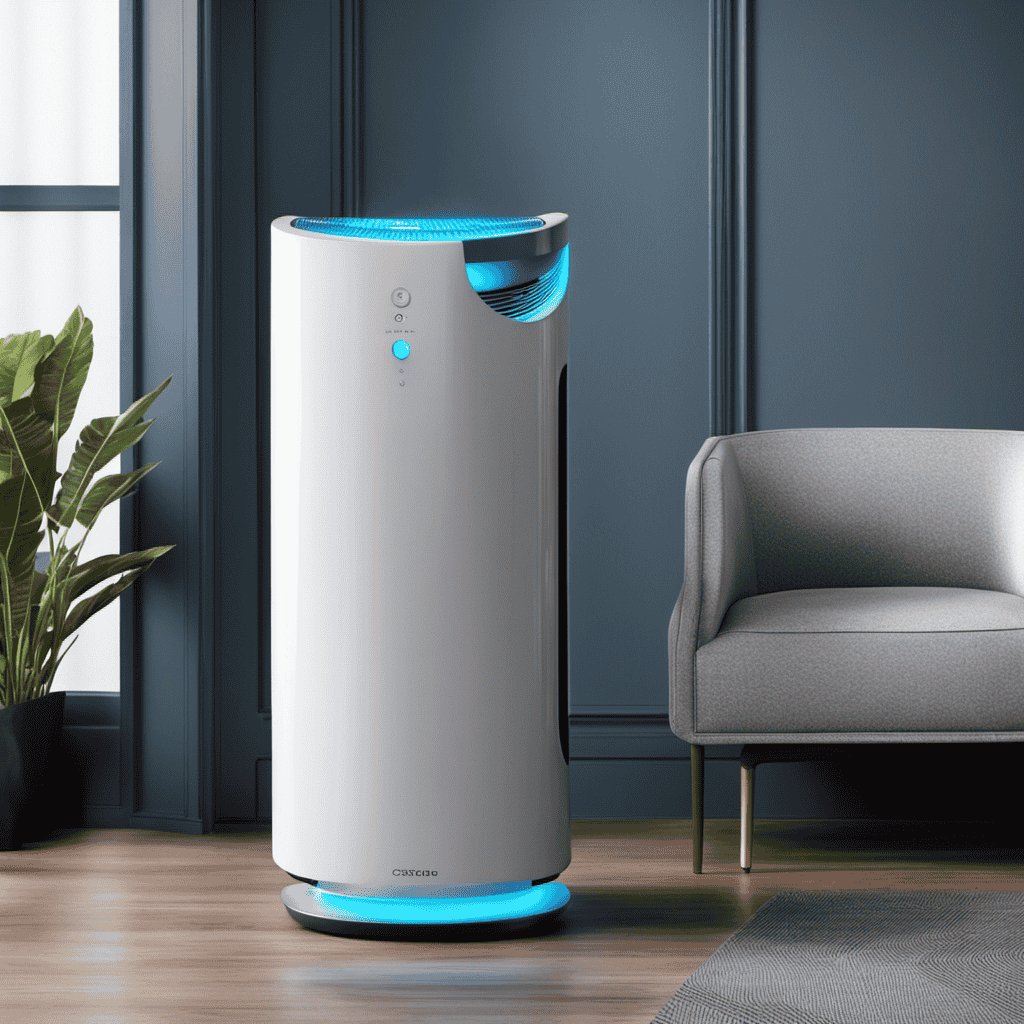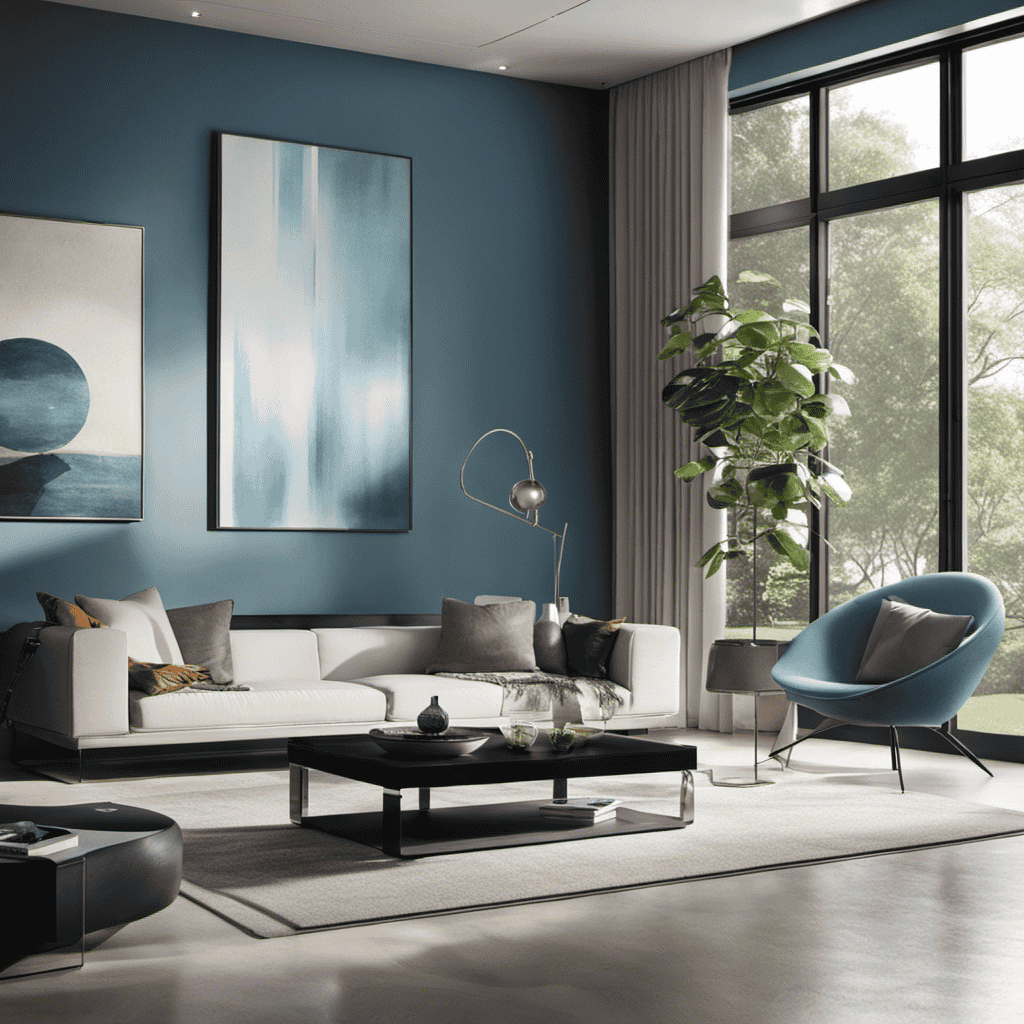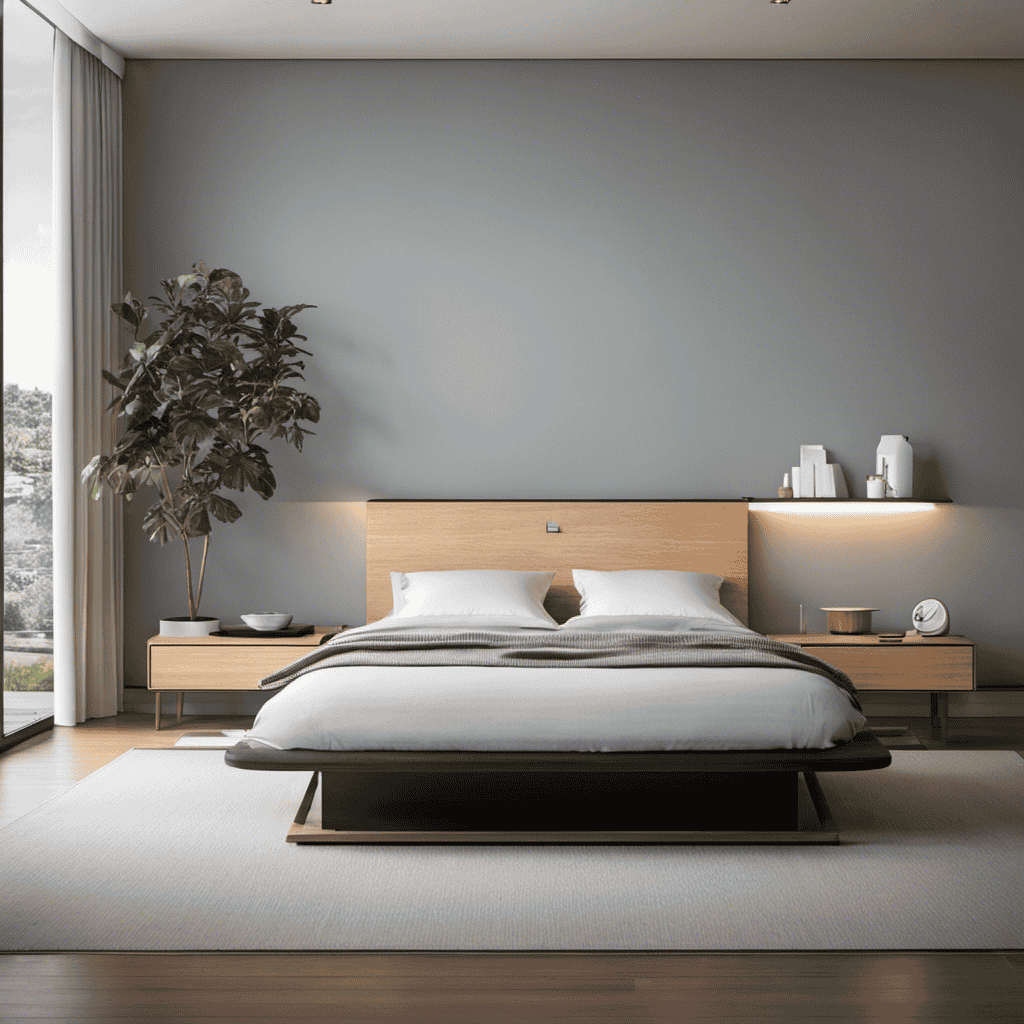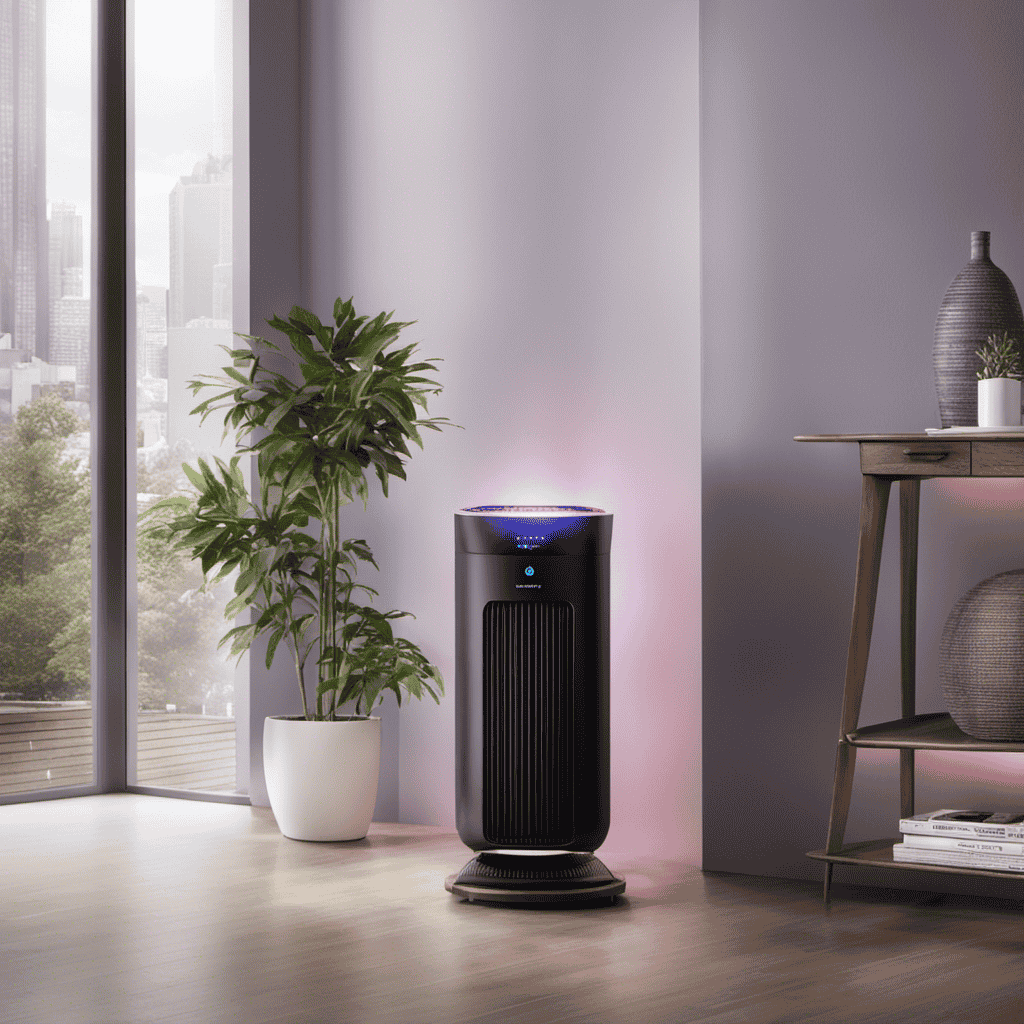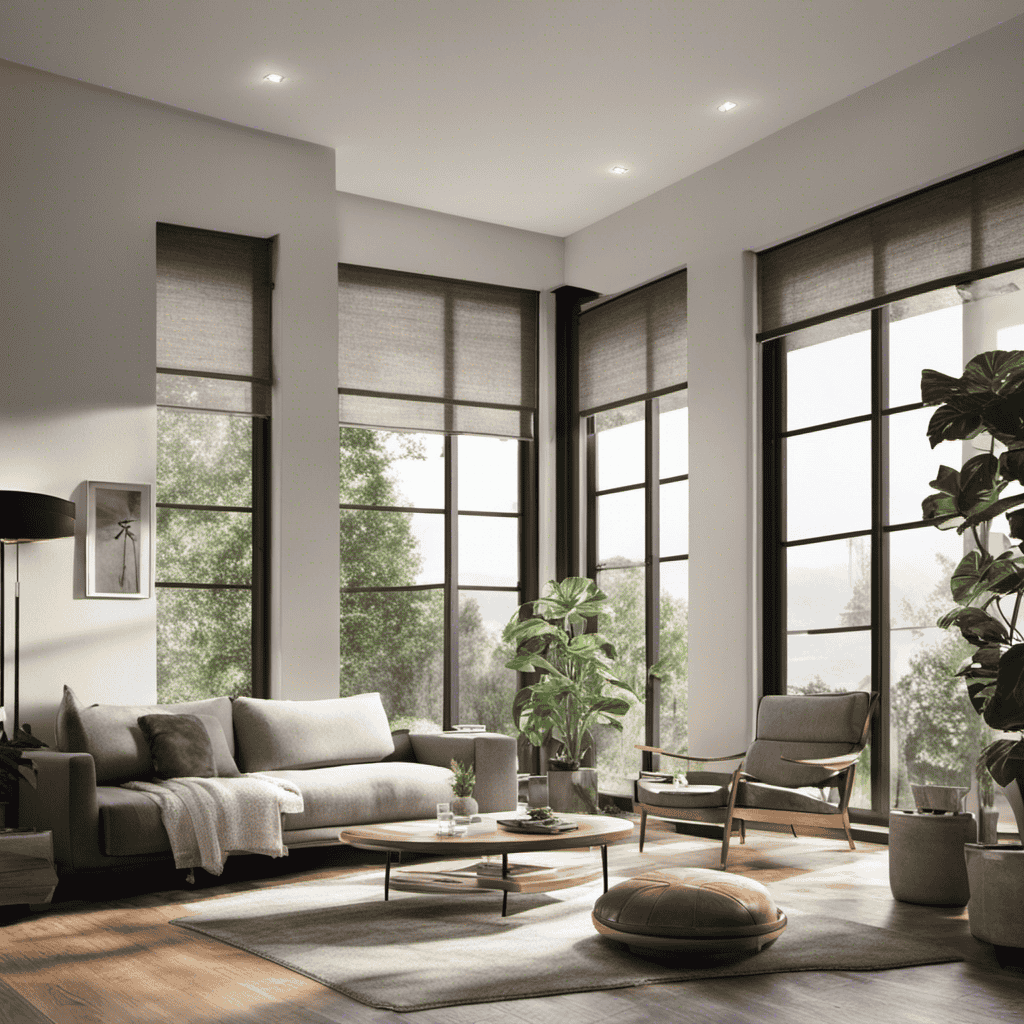How Often Should You Change the Filters
Did you know that the air we breathe indoors can be up to five times more polluted than the air outside? That’s why it’s crucial to regularly change the filters in our HVAC systems.
In this article, I’ll provide you with expert advice on how often you should change your filters, the factors that affect their lifespan, and the signs that indicate it’s time for a replacement.
Let’s dive in and ensure the air we breathe is clean and healthy.
Key Takeaways
- Regular filter changes are important for maintaining clean and efficient air quality.
- The lifespan of filters depends on factors like filter type, air quality, and usage, but on average, filters should be replaced every 3 months.
- Filters should be changed more frequently for pet owners, allergy sufferers, and in areas with high pollutant levels.
- Signs that filters need to be replaced include reduced airflow, increased dust/allergens, and unpleasant odors or tastes in the air.
Importance of Regular Filter Changes
Regularly changing your filters is important for maintaining clean and efficient air quality in your home. As a homeowner, I understand the significance of filter maintenance and the impact it has on the overall performance of my HVAC system. The lifespan of a filter can vary depending on several factors such as the type of filter, the quality of air in your home, and the frequency of system usage. On average, most filters need to be replaced every three months. However, if you have pets, allergies, or live in an area with high levels of pollutants, it is recommended to change the filters more frequently, perhaps every one to two months.
Proper filter maintenance is crucial because it ensures that the air circulating throughout your home is free from dust, allergens, and other contaminants. A dirty or clogged filter not only compromises the air quality but also affects the efficiency of your HVAC system. When a filter becomes congested, it restricts the airflow, causing the system to work harder and consume more energy. This not only increases your energy bills but also puts unnecessary strain on the system, potentially leading to costly repairs.
By regularly changing your filters, you are not only improving the air quality in your home but also extending the lifespan of your HVAC system. It is a simple yet effective way to optimize the performance of your system and ensure a healthy living environment for you and your family.
Factors Affecting Filter Lifespan
One of the factors that can affect the lifespan of filters is how frequently they are used. The more often a filter is used, the quicker it will become clogged with debris and require replacement.
Here are four factors that can impact the lifespan of filters:
-
Quality of air: Filters in environments with high levels of pollutants or contaminants will need to be replaced more frequently. These particles can quickly build up and reduce the effectiveness of the filter.
-
Filter type: Different types of filters have varying lifespans. For example, HEPA filters are designed to capture small particles and typically need to be replaced more frequently than standard filters.
-
Maintenance: Regular maintenance, such as cleaning or changing pre-filters, can extend the lifespan of the main filter. Neglecting maintenance tasks can lead to a shorter filter lifespan.
-
Airflow: Filters that are exposed to high airflow rates may experience more wear and tear, reducing their lifespan. It’s important to consider the airflow requirements of the filter and ensure it is properly installed.
Understanding these filter lifespan factors is crucial when determining the filter replacement frequency. By taking these factors into account, you can ensure that your filters are changed at the appropriate intervals, maximizing their efficiency and prolonging their lifespan.
In the subsequent section, we will discuss the recommended filter change frequency based on these factors.
Recommended Filter Change Frequency
The recommended frequency for changing filters varies based on factors such as air quality, filter type, maintenance, and airflow. Regular filter changes are of utmost importance to maintain optimal performance and to ensure the longevity of your HVAC system. A clogged or dirty filter can impede airflow, reduce air quality, and lead to increased energy consumption.
One of the signs that your filters need to be replaced is reduced airflow. If you notice that the airflow coming from your vents is weaker than usual, it could be a sign that your filters are clogged and need to be changed. Another sign is an increase in dust and allergens in your home. If you find yourself constantly dusting or experiencing worsening allergies, it may be time to replace your filters.
Additionally, if you have pets or if you live in an area with high levels of pollution or construction, you may need to change your filters more frequently. These factors can lead to faster accumulation of dust and debris in your filters, reducing their effectiveness.
Signs That Your Filters Need to Be Replaced
As an HVAC technician, I often come across various signs that indicate when filters need to be replaced.
One common sign is clogged air, which can be felt through reduced airflow and poor ventilation. This can lead to reduced efficiency in the HVAC system, as it has to work harder to push air through the clogged filters.
Additionally, visible dirt or debris on the filters is another clear indication that they need to be replaced.
Lastly, unpleasant odors or tastes in the air can also be a result of filters that are past their prime and need to be changed.
Clogged Air, Reduced Efficiency
If your air filters are clogged, it can reduce the efficiency of your HVAC system. Clogged filters restrict airflow, causing your system to work harder and consume more energy. This can lead to higher energy bills and decreased comfort in your home. To prevent these issues, regular filter maintenance is crucial.
Here are four key points to consider when it comes to filter replacement:
-
Frequency: Filters should typically be replaced every 1-3 months, depending on factors such as the type of filter, indoor air quality, and the presence of pets or smokers in the home.
-
Visual inspection: Check your filters regularly for visible dirt, dust, or debris. If they appear dirty or discolored, it’s time for a replacement.
-
Efficiency rating: Consider using high-efficiency filters with a MERV (Minimum Efficiency Reporting Value) rating of 8 or higher for optimal air filtration.
-
Manufacturer’s recommendations: Always follow the manufacturer’s guidelines for filter replacement to ensure optimal performance and longevity of your HVAC system.
Visible Dirt or Debris
After discussing the issue of clogged air and reduced efficiency in the previous subtopic, let’s move on to the current subtopic of visible dirt or debris.
When it comes to improving filtration and maximizing the lifespan of your filters, it’s crucial to monitor the accumulation of visible dirt or debris. Regularly checking your filters for these signs will allow you to determine when they need to be changed.
Factors that can affect the lifespan of your filters include the level of pollutants in your environment, the quality of your filters, and the frequency of filter maintenance. By being proactive and addressing visible dirt or debris promptly, you can ensure that your filters continue to function efficiently and effectively.
Unpleasant Odors or Tastes
To address unpleasant odors or tastes, simply ensure that you regularly clean and maintain your filters. Here are four important steps to improve filter performance and eliminate unwanted smells:
-
Clean the filter regularly: Over time, filters can become clogged with dirt, debris, and bacteria, leading to unpleasant odors. Regularly cleaning the filters will help maintain their effectiveness in trapping contaminants and improve the overall air quality.
-
Use activated carbon filters: Activated carbon filters are highly effective at absorbing and neutralizing odors. Consider using these specialized filters in areas where strong smells are present, such as the kitchen or bathroom.
-
Check for mold or mildew: Mold and mildew can grow on filters, causing foul odors. Regularly inspect the filters for any signs of mold or mildew and clean or replace them if necessary.
-
Consider air purifiers: In addition to regular filter maintenance, using an air purifier can further improve indoor air quality and eliminate unwanted smells. Look for purifiers with HEPA filters to ensure optimal performance.
By following these steps, you can significantly improve filter performance and eliminate unpleasant odors in your living space.
However, it’s important to be aware of common mistakes people make with filter changes to avoid further issues.
Common Mistakes People Make With Filter Changes
When it comes to filter changes, there are two common mistakes that people often make: neglecting regular filter maintenance and using incorrect filter sizes.
Neglecting regular filter maintenance can lead to a buildup of dust, dirt, and other contaminants, reducing the effectiveness of the filter and potentially causing damage to the system.
Using incorrect filter sizes can also have negative consequences, as it can result in poor air flow and decreased filtration efficiency.
Therefore, it is important to prioritize regular filter maintenance and ensure that the correct filter sizes are used to optimize the performance of your system.
Neglecting Regular Filter Maintenance
Neglecting regular filter maintenance can lead to decreased air quality in your home. As an HVAC technician, I have seen common mistakes people make when it comes to filter changes. Here are four important reasons why you should never neglect regular filter maintenance:
-
Reduced Airflow: When filters are clogged with dust and debris, it restricts the airflow, causing your HVAC system to work harder and less efficiently.
-
Increased Energy Consumption: A clogged filter puts a strain on your system, leading to increased energy consumption and higher utility bills.
-
Poor Indoor Air Quality: Neglected filters fail to trap allergens, dust, and other pollutants effectively, resulting in poor indoor air quality and potential health issues.
-
Extending Lifespan: Regular filter changes can extend the lifespan of your HVAC system by preventing unnecessary wear and tear, saving you money on expensive repairs or replacements.
Using Incorrect Filter Sizes
Using the wrong filter sizes can negatively impact the performance of your HVAC system. Improper installation and usage of filters that are too small or too large can lead to reduced airflow and decreased efficiency.
When the filter is too small, it may not effectively capture and remove airborne particles, allowing them to circulate throughout the system. On the other hand, a filter that is too large can cause air bypass, which means the air will go around the filter instead of passing through it.
This can result in dust and debris accumulating on the system’s components, leading to decreased lifespan and potential damage. It is crucial to ensure that the filter size matches the specifications recommended by the manufacturer to maintain optimal performance and extend the filter’s lifespan.
How to Extend the Lifespan of Your Filters
To extend the lifespan of your filters, it’s important to regularly clean and maintain them. Here are four key steps to maximize filter performance and ensure they last as long as possible:
-
Regular Cleaning: Clean your filters at least once a month, or more frequently if you live in a particularly dusty environment. Use a soft brush or vacuum to remove any accumulated dirt and debris. This will help prevent clogs and maintain optimal airflow.
-
Proper Storage: When not in use, store your filters in a clean, dry area. Avoid exposing them to excessive moisture or direct sunlight, as this can cause mold or deterioration.
-
Filter Replacement: While regular cleaning is essential, filters do have a lifespan. It’s important to follow the manufacturer’s recommendations for replacement intervals. Ignoring this can result in reduced efficiency and compromised air quality.
-
Professional Maintenance: Consider scheduling regular maintenance visits with a professional to ensure your filters are in top condition. They can inspect, clean, and replace filters as needed, as well as identify any potential issues before they become major problems.
Different Types of Filters and Their Replacement Intervals
The different types of filters available for your home have varying replacement intervals that should be followed to ensure optimal performance. Proper filter maintenance is essential for maintaining clean and healthy indoor air quality. Neglecting filter replacement can lead to reduced efficiency and increased filter replacement costs in the long run.
Below is a table showcasing the common types of filters used in homes and their recommended replacement intervals:
| Filter Type | Replacement Interval |
|---|---|
| Fiberglass Filters | 1-3 months |
| Pleated Filters | 3-6 months |
| Electrostatic Filters | 6-12 months |
By adhering to these recommended replacement intervals, you can ensure that your filters are working effectively and efficiently. Regularly changing your filters not only improves air quality but also helps to prevent dust, pollen, and other contaminants from circulating in your home.
Now that we understand the importance of filter maintenance and replacement, let’s explore the impact of dirty filters on air quality in the next section.
The Impact of Dirty Filters on Air Quality
As an expert in indoor air quality, I want to discuss the health risks associated with dirty filters and how they can impact the overall air quality in a building.
Dirty filters can lead to a buildup of dust, allergens, and other contaminants, which can worsen respiratory conditions and allergies.
Health Risks of Dirty Filters
If you neglect to change your filters regularly, you risk exposing yourself to potential health hazards. Dirty filters can contribute to poor indoor air quality, leading to various health risks and respiratory problems. Here are four important reasons to stay on top of filter maintenance:
-
Airborne allergens: Dirty filters can’t effectively trap allergens like pollen, pet dander, and dust mites, which can trigger allergies and asthma attacks.
-
Mold growth: Moisture and organic matter trapped in dirty filters create an ideal environment for mold growth. Breathing in mold spores can cause respiratory issues and allergic reactions.
-
Reduced lung function: Clogged filters restrict airflow, making it harder to breathe. This can strain your respiratory system, leading to shortness of breath and decreased lung function over time.
-
Increased risk of infections: Bacteria and viruses can accumulate and multiply in dirty filters. Breathing in these microorganisms can increase the likelihood of respiratory infections.
To protect your health, it is crucial to change your filters regularly and maintain good indoor air quality.
Improving Indoor Air Quality
Now that we understand the health risks associated with dirty filters, let’s explore how we can improve indoor air quality through regular filter maintenance.
The frequency at which you should change your filters depends on various factors, such as the type of filter and the level of pollutants in your environment. On average, it is recommended to replace filters every three months. However, in high-pollution areas or households with pets, more frequent maintenance may be required.
It is important to note that neglecting filter maintenance can lead to increased energy consumption and higher filter replacement costs in the long run. By regularly replacing and cleaning filters, you can ensure optimal performance of your HVAC system and enjoy the benefits of clean indoor air.
Benefits of Regular Filter Maintenance
To keep your HVAC system running efficiently, you should make sure to regularly change the filters. Filter maintenance is a crucial aspect of HVAC system upkeep, as it offers several benefits that contribute to the overall performance and longevity of the system.
Here are four reasons why regular filter changes are important:
-
Improved Air Quality: Filters trap airborne particles such as dust, pollen, and pet dander, preventing them from circulating in your home. Regularly changing the filters ensures that these contaminants are effectively removed, leading to cleaner and healthier indoor air.
-
Enhanced Energy Efficiency: A clean filter allows for better airflow, reducing the strain on your HVAC system. This, in turn, improves energy efficiency and lowers utility costs.
-
Extended Equipment Lifespan: When filters become clogged with debris, it can restrict airflow and cause your HVAC system to work harder than necessary. By regularly replacing the filters, you can prevent unnecessary wear and tear on the equipment, extending its lifespan.
-
Cost Savings: Neglecting filter maintenance can result in costly repairs or even premature system failure. By investing in regular filter changes, you can avoid these expenses and enjoy long-term cost savings.
Understanding Filter Efficiency Ratings
Understanding filter efficiency ratings can help you select the most effective filters for your HVAC system. When it comes to filter performance, it’s important to understand filtration efficiency. This rating indicates how effectively a filter can capture and remove airborne particles from the air passing through it. The higher the efficiency rating, the more particles the filter can trap.
Filtration efficiency is typically measured using the Minimum Efficiency Reporting Value (MERV) scale. This scale ranges from 1 to 16, with higher numbers indicating higher efficiency. Filters with a higher MERV rating are capable of capturing smaller particles, including dust, pollen, pet dander, and even bacteria and viruses.
To select the most effective filter for your HVAC system, consider the specific needs of your indoor environment. If you have allergies or respiratory issues, you may want to choose a filter with a higher MERV rating to remove smaller particles. However, it’s important to note that higher efficiency filters may also restrict airflow and require more frequent replacement.
Understanding filter efficiency ratings is crucial in maintaining indoor air quality and ensuring the optimal performance of your HVAC system. By selecting the right filter for your needs, you can enhance the overall air filtration in your home or office, promoting a healthier and more comfortable living environment.
Tips for Choosing the Right Filters for Your Needs
When selecting filters for your HVAC system, it’s important to consider the specific needs of your indoor environment. Proper filter maintenance and regular replacement are crucial for maintaining good indoor air quality and maximizing the efficiency of your HVAC system.
Here are some tips to help you choose the right filters for your needs:
-
Understand the MERV rating: The Minimum Efficiency Reporting Value (MERV) indicates how effectively a filter can capture particles of different sizes. Higher MERV ratings mean better filtration, but they can also restrict airflow in your system.
-
Consider your specific needs: If you have family members with allergies or asthma, a filter with a higher MERV rating (between 8 and 13) is recommended. For general household use, a filter with a MERV rating of 6 to 8 should suffice.
-
Check the filter size: Make sure you know the correct size of your HVAC system’s filter. A filter that is too small or too large will not fit properly and may not provide adequate filtration.
-
Evaluate filter replacement options: There are various types of filters available, such as fiberglass, pleated, and electrostatic. Each has its pros and cons, so consider factors like cost, filtration efficiency, and ease of installation when choosing the right filter for your needs.
DIY Filter Replacement Vs. Professional Services
After learning about the right filters for your needs, it’s important to consider whether to replace them yourself or hire professional services. DIY filter replacement can be a cost-effective option, but it requires some technical knowledge and effort. On the other hand, professional services offer convenience and expertise, but they come with a higher price tag.
To help you make an informed decision, here is a cost comparison between DIY filter replacement and professional services:
| Factors | DIY Filter Replacement | Professional Services |
|---|---|---|
| Cost | Lower | Higher |
| Convenience | Moderate | High |
| Expertise | Varies based on knowledge | High |
| Time | Requires time and effort | Quick and efficient |
As you can see, DIY filter replacement may save you some money, but it requires more time and effort on your part. Professional services, while more expensive, offer convenience and expertise, ensuring the job is done efficiently.
Now that you understand the options, let’s move on to answering some frequently asked questions about filter changes.
Frequently Asked Questions About Filter Changes
Let’s take a look at some common questions people have about changing their filters.
Regular maintenance of filters is essential for the smooth operation of your system and to ensure clean air quality in your home or workplace.
Here are four frequently asked questions about filter changes:
-
How often should I change my filters?
- It is recommended to change your filters every 1 to 3 months, depending on the type of filter and the level of air pollutants in your surroundings. Regularly changing filters prevents clogging and maintains optimal airflow.
-
What are the benefits of clean filters?
- Clean filters improve indoor air quality by trapping dust, pollen, pet dander, and other airborne particles. They also enhance the efficiency of your HVAC system, resulting in lower energy consumption and reduced utility bills.
-
How can I tell if my filters need changing?
- Look for signs of a dirty filter, such as reduced airflow, visible dirt or debris on the filter, and musty or unpleasant odors. Regularly inspecting your filters will help you determine when they need replacement.
-
Can I clean and reuse my filters?
- It depends on the type of filter. Some filters can be cleaned and reused, while others are disposable. Refer to the manufacturer’s instructions or consult a professional to determine the best approach for your specific filter.
Regularly changing and maintaining your filters is crucial for the efficient and effective operation of your HVAC system. By doing so, you can enjoy improved indoor air quality, energy savings, and a longer lifespan for your equipment. Don’t underestimate the importance of regular filter maintenance!
Frequently Asked Questions
Can I Clean and Reuse My Filters Instead of Replacing Them?
Yes, you can clean and reuse filters instead of replacing them, but it is not always recommended.
While reusable filter options exist, it is important to consider the benefits of replacing filters regularly.
Cleaning filters may not completely remove all dirt and debris, reducing their effectiveness over time.
Additionally, dirty filters can restrict airflow, causing strain on your system and potentially leading to higher energy consumption.
Regularly replacing filters ensures optimal performance and improved air quality.
Is It Necessary to Change the Filters in Every Room of My House?
Changing the filters in every room of my house is not necessary. There are cost-effective alternatives and alternative filtration methods available.
It is important to assess the air quality in each room and determine which areas require filter changes more frequently. By doing so, you can save money and ensure that the air in your home remains clean and healthy.
Regular maintenance and cleaning of filters can also prolong their lifespan, reducing the need for frequent replacements.
Can I Use Filters From Different Brands Interchangeably?
Using filters from different brands interchangeably can have both pros and cons.
On the positive side, it provides more options and potentially lowers costs.
However, there are some drawbacks to consider.
Different brands may have varying levels of quality and effectiveness, which could impact the overall performance of your HVAC system.
To find compatible filters for your system, it’s best to consult your HVAC manufacturer’s recommendations or seek advice from a professional.
How Do I Know if My Filters Are Compatible With My HVAC System?
To find the right size filters for my HVAC system, I need to consult the manufacturer’s specifications or contact a professional for assistance.
Common signs that indicate my filters are not compatible with my HVAC system include reduced airflow, increased energy consumption, and poor air quality.
It is important to ensure that the filters I use are compatible to maximize the efficiency and effectiveness of my HVAC system.
Regularly checking and replacing filters is crucial for optimal performance.
Are There Any Filters That Can Last a Lifetime Without Needing Replacement?
There are filters on the market that claim to last a lifetime without needing replacement. However, it is important to note that these filters still require regular maintenance and cleaning to ensure optimal performance.
Properly cleaning and maintaining reusable filters can help extend their lifespan. Some tips and tricks for filter maintenance include using a vacuum or gentle cleaning solution to remove dirt and debris, and allowing the filter to fully dry before reinstalling.
Conclusion
In conclusion, it’s crucial to understand the importance of regular filter changes. They can greatly impact the efficiency of your system. By neglecting filter maintenance, you’re essentially allowing dirt and contaminants to clog up your system. This can hinder its performance and potentially cause damage. Just like a well-oiled machine, your HVAC system relies on clean filters to function optimally.
So, remember to stay on top of your filter replacements. It’s like a vigilant gardener tending to their precious plants. This will ensure a smooth and efficient operation.




